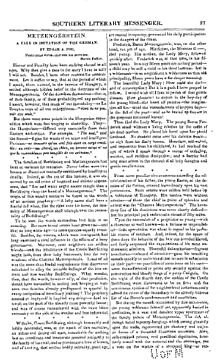Metzengerstein

Metzengerstein is the first short story by Edgar Allan Poe . It appeared for the first time in 1832 in The Saturday Courier , for the second time in 1836 in The Southern Literary Messenger under the expanded title Metzengerstein, a Tale in Imitation of the German ( M., a short story in the German style ).
content
Poe opens with a sentence that can almost be seen as the program of his short story production: Horror and misfortune race unbridled through the centuries. Two families, the Metzengerstein and the Berlifitzing, live in castles standing close together in centuries-old hostility in Hungary . Wilhelm Graf von Berlifitzing is an extinct old man who only knows one pleasure, hunting.
His rival is Frederick Baron von Metzengerstein, a young man in full possession of his powers. He has just lost his parents and perpetrates atrocities without number or measure, which is why he is known as the second caligula . So he puts the stables Berlifitzings and sinks, now even second Nero , while they burn, in the consideration of a wall hanging a huge warhorse shows whose riders, a Berlifitzing, is killed in the background of a Metzengerstein. In the firelight of the burning stables, this horse seems to move, come to life and bare dead teeth in supplication . Terrified, Metzengerstein hurries outside. There three stable boys bring him a huge, fiery red horse, which they can hardly tame. Allegedly it broke out of the burning stables of Berlifitzing, it also bears the brand WVB on its forehead - but Berlifitzing's servants deny that they had anything to do with the animal - and old Berlifitzing is trying to save his horses in the Perished fire.
This unnamed horse now becomes the purpose of Frederick von Metzengerstein's life, who renounces his former malice and rides the animal so often that he apparently cannot get out of his saddle. A page claims that Frederick never climbs it without an inner horror. One morning when he disappeared into the forest on his horse, his castle went up in flames. The residents watch helplessly; then the horse comes back at a frenzied gallop, Metzengerstein has obviously lost control of it, horse and rider disappear into the burning castle, above which a cloud of smoke in the shape of a horse forms.
interpretation
Even in this first short story, Poe makes use of the trick that is typical of him, namely to precede the story with a theoretical consideration. Here he points out that the story comes from a time when the transmigration of souls had many followers. He suggests that the soul of old Berlifitzing passed into the huge steed at the moment of his death, which bears his brand mark on his forehead and which Frederick von Metzengerstein wears in the same fiery death that old Berlifitzing suffered. Poe supports this interpretation by citing a prophecy at the beginning :
- A great name will perish in the most terrible way when the mortality of Metzengerstein, like the rider over his horse, triumphs over the immortality of Berlifitzing. ( A lofty name shall have a fearful fall when, as the rider over his horse, the mortality of Metzengerstein shall triumph over the immortality of Berlifitzing. )
It was not the rider who triumphed over the horse, but the horse over the rider, so the prophecy is turned into A great name will perish when the mortality of Berlifitzing (the horse) triumphs over the - apparent - immortality of Metzengerstein.
But if you consider how often it is women who awaken to an uncanny new life in Poe (in Morella , The Downfall of the House of Usher , Eleonora , Ligeia ) and that the horse bares Berenice's dead teeth , then the interpretation is imperative here too Marie Bonaparte , who sees the horse ("steed") awakening to life from a tapestry, a symbol of the mother, with whom the protagonist can only unite in death due to the prohibition of incest (his shudder when mounting the horse!) - comparable to that synchronous suicide of the stranger and the Marchesa Afrodite in The Appointment .
Unmistakable is a satirical tone (e.g. the names of the two families), with which Poe distanced himself from this German way of generating horror at an early stage. In the preface to Tales of the Grotesque and Arabesque in 1840 , it is stated that only one of his stories (probably Metzengerstein ) uses Germanic pseudo-horrors, but otherwise his horror does not come from Germany, but from the soul.
Adaptations
- Film: Metzengerstein by Roger Vadim , one of three episodes in Histoires extraordinaires , 1968. With Jane Fonda as Contessa Frederica
- Edgar Allan Poe (radio play series) , radio play, freely based on Poe
literature
expenditure
The relevant modern edition is also available online, including the critical apparatus:
- Metzengerstein . In: Thomas Ollive Mabbott (Ed.): The Collected Works of Edgar Allan Poe . Volume 2: Tales & Sketches I . Belknap Press of Harvard University Press, Cambridge Mass. 1978, pp. 15-31.
Secondary literature
- Jerome DeNuccio: History, Narrative, and Authority: Poe's Metzengerstein . In: College Literature 24: 2, 1997, pp. 71-81.
- Benjamin F. Fisher: Poe's 'Metzengerstein': Not a Hoax . In: American Literature 42, 1971, pp. 487-94.
- Travis Montgomery: Poe's Oriental Gothic: Metzengerstein (1832), The Visionary (1834), Berenice (1835), the Imagination and Authorship's Perils . In: Gothic Studies 12: 2, 2010, pp. 4–28.
- George H. Soule, Jr: Byronism in Poe's 'Metzengerstein' and 'William Wilson' . In: ESQ 24, 1978, pp. 152-62.
- GR Thompson : Poe's 'Flawed' Gothic: Absurdist Techniques in 'Metzengerstein' and the 'Courier' Satires . In: Emerson Society Quarterly 60 (Supplement), 1970, pp. 38-58. Revised version in: GR Thompson: Poe's Fiction: Romantic Irony in the Gothic Tales . Wisconsin University Press, Madison Wisc., 1973, pp. 52ff.
